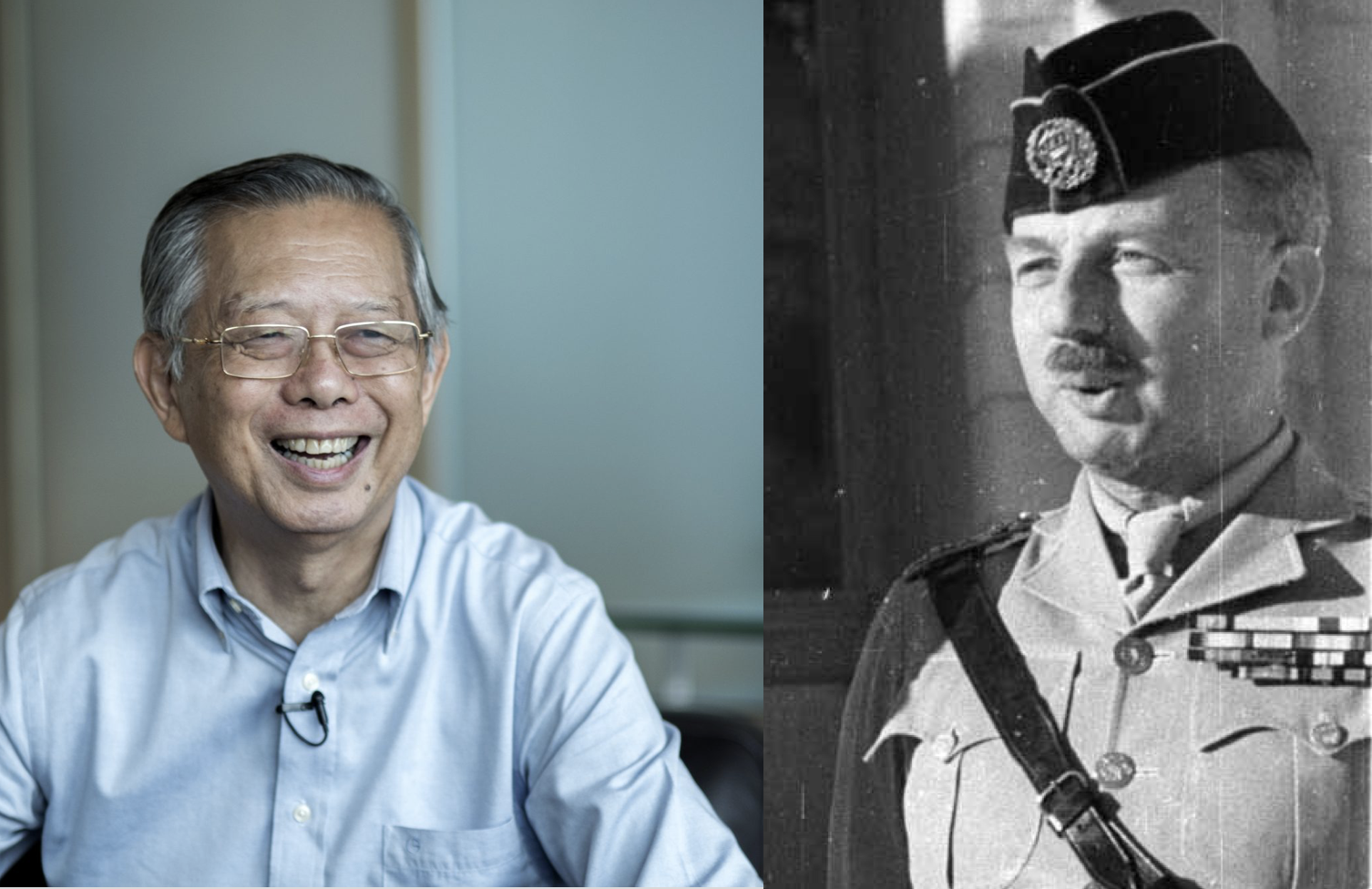Born in 1897, Lt. General Sir John Bagot Glubb is most famous for serving as the commanding officer of the Arab Legion - another name for the army of the Kingdom of Jordan in the 1940s. Having fought in World War 1, he also saw action in World War 2 and the 1948 Arab-Israeli war.
Aside from commanding armies, Glubb also dabbled in writing. One of his essays, The Fate of Empires and Search for Survival, caught the eye of former top civil servant Lim Siong Guan.
Lim is best known for serving as the former head of the Civil Service, and Group President of the GIC.
Lim chose to speak about the lessons one could learn from that essay for a Singaporean context, during a lecture he gave at the Institute of Policy Studies' Nathan Lecture, quoting Glubb's analysis on the seven stages of the rise and fall of great nations, which we summarised below:
1. Age of Pioneers
Where it all begins, a small nation, treated as insignificant by others, suddenly emerges and conquers the world. This is possible because the pioneers have no past traditions to defer to.
"If one method fails, they try something else. Uninhibited by textbooks or book learning, action is their solution to every problem."
2. Age of Conquest
Then the country moves on to a stage of great expansion. According to Glubb (and Lim):
"The principal objects of ambition are glory and honour for the nation."
This leads to the acquisition of "vast territories" under a single government which in turn creates opportunities to gain wealth.
[caption id="" align="alignnone" width="498"] Gif from Tenor.[/caption]
Gif from Tenor.[/caption]
3. Age of Commerce
The main purpose of this stage is to create more wealth. But Glubb warns:
"The acquisition of wealth soon takes precedence over everything else. The previous objectives of “glory” and “honour” are but “empty words, which add nothing to the bank balance” for the people."
So people start becoming more materialistic, and don't care about honour because they don't have intrinsic monetary value. It should be mentioned at this point that Lim is the founding chairman of Honour SG, a non-profit organisation dedicated to promoting a "culture of honour and honouring." So honour is important to him.
4. Age of Affluence
Here's where things start to get bad (supposedly). The pursuit of money becomes the younger generation's driving goal, and no one cares about honour anymore. The rich poor gap increases, and people begin consuming in excess.
"The object of the young and ambitious is no longer fame, honour or service, but cash."
Glubb calls the shift from Stage 3 to Stage 4 "High Noon", where people become more greedy and selfish. The country solves its problems by throwing money at them, and selfless men who serve without thought of reward can't be found.
[caption id="" align="alignnone" width="498"] Gif from Tumblr.[/caption]
Gif from Tumblr.[/caption]
5. Age of Intellect
Intellect sounds good what, you might be saying to yourself. Not true, says Glubb. On one hand yes, the country has now become so rich that it can afford to fund advancements in the sciences, academics and the arts. But on the other, too much faith is placed in intellectual discussion and nothing actually gets done.
As Lim puts it:
"Intellectualism leads to discussion, debate and argument, which is often seen around the world today. But this “constant dedication to discussion seems to destroy the power of action”."
6. Age of Decadence
We're in hard times now. This is the stage where disaster is looming just ahead. Citizens don't make the effort to save themselves or their country because they don't think anything is worth saving.
"The Age of Decadence comes about because of the following factors: An extended period of wealth and power; selfishness; love of money and loss of a sense of duty.
It is marked by defensiveness, pessimism, materialism, frivolity, an influx of foreigners, the welfare state and a weakening of religion."
7. Age of Decline
Same as the above.
Probably with more fires and mutant gangs roaming the streets.
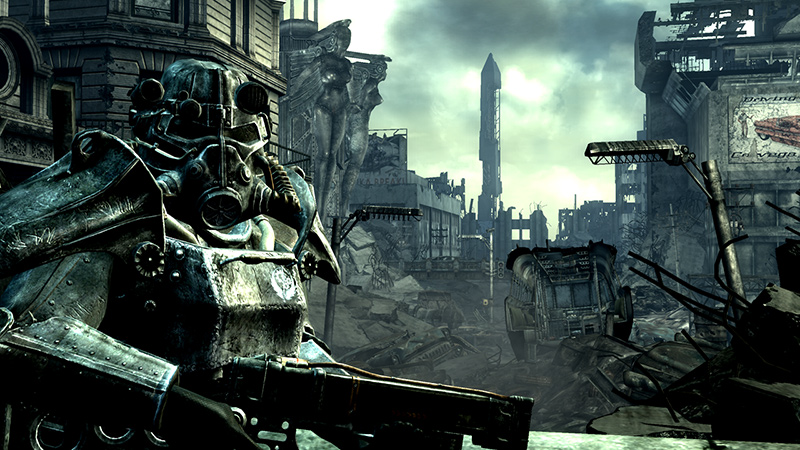 Pic from Amazon.
Pic from Amazon.
Singapore is a decadent city?
Now the point Lim seems to be trying to make is that of the seven characteristics of the Age of Decadence, Singapore is already experiencing at least five of them. Here's our attempt to explain what each of these characteristics mean:
- Defensiveness. People care more about their own wealth and family than the nation.
- Pessimism. Incessant complaining and a deep-rooted belief that Liverpool may never win the League. Sobs
- Materialism. Self-explanatory. If you've ever followed an influencer on Instagram, you're guilty.
- Frivolity. The statesman/general/literary genius is not as respected as the athlete/singer/actor these days.
- Influx of foreigners. Oh boy.
And if that wasn't enough, Lim says that an argument could be made for the last two, as Singapore's policies have shifted away from just "self-reliance", and there's been a rise in the number of atheists and agnostics in Singapore.
Lim concludes his lecture by saying that Singapore could be in the High Noon, Intellect, or Decadence stage, it's hard to tell. What's important is the kind of nation we want to be, and whether Singapore can avoid its horrible fate as outlined by Glubb.
All is not lost
While Glubb might have been an impressive military man, it's important to remember that he was a product of his era and upbringing. He was literally born in the 19th century, grew up as an officer of the British Empire, and lived to see its decline and fall. No wonder he wrote a gloomy essay about the fall of empires.
It can be very attractive to try and draw comparisons between old-timey papers and the world today. "He said A and B would happen, and they did happen, therefore that means C must happen too!"
However, with each negative example, one can find an equally positive example to counter it.
Witness how anonymous donations pour in when a Singaporean is caught in a crisis, like the case of Eileen Cheong's father who suffered a heart attack while in Tokyo. Her crowdfunding appeal to bring her father home more than met its target.
Or how about our athletes in Team Singapore, who give up lucrative opportunities just for the chance to win glory for the nation at international sporting events? They certainly don't do it for the money. If Glubb was right, these people wouldn't exist today.
The honour and civic-mindedness that Glubb fears as lost can still be found, if one chooses to find it. Yes, even among foreign immigrants. Like the hero who saved a toddler who was stuck on the second floor.
Online reactions mixed
Lim's speech is proving to be quite popular (garnering over 1000 FB likes on the evening of Sep. 13). Some commenters were in favour of his speech:
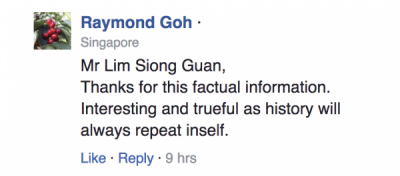 Screen shot from Today Online.
Screen shot from Today Online.
 Screen shot from Today Online.
Screen shot from Today Online.
While some disagreed:
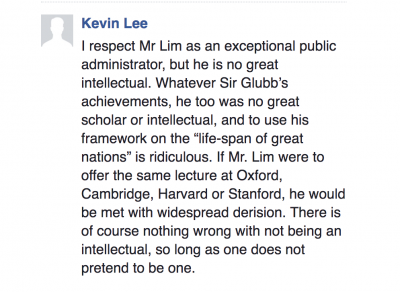 Screen shot from Today Online.
Screen shot from Today Online.
And some were shook.
 Screen shot from Today Online.
Screen shot from Today Online.
More to come
This speech is meant to be a first in a three-part lecture series helmed by Lim. One wonders if the other two will touch on similar themes. Overall, his speech sounded quite like the typical old person's complaint about how the youth of today will lead to the end of civilisation.
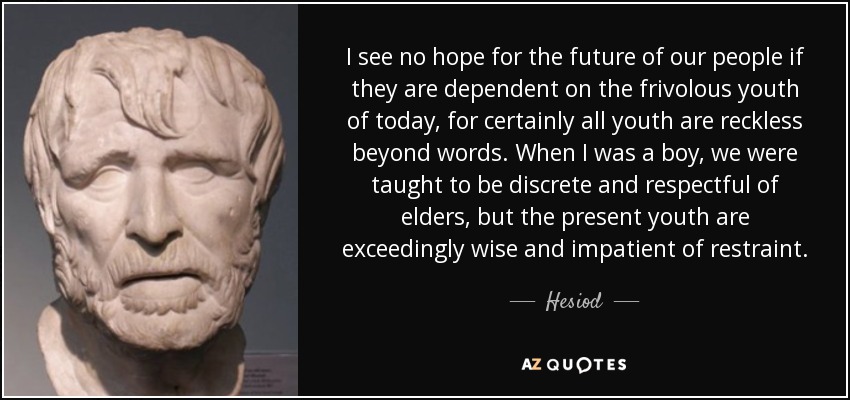 Hesiod lived in 700 BC. Pic from AZ Quotes.
Hesiod lived in 700 BC. Pic from AZ Quotes.
While reading past studies and tomes, it's important not only to draw lessons from them, but also to keep an open mind and think hard on whether it can really serve as a crystal ball predicting what the world would look like tomorrow.
And if the past can always predict the present...then you might as well stop dreaming about the future.
Related stories:
GIC Group President Lim Siong Guan: a workaholic 69-year-old who takes the MRT
Top image from the National Archives blog.
If you like what you read, follow us on Facebook, Instagram, Twitter and Telegram to get the latest updates.
